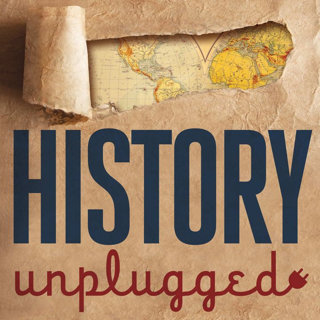
The Lost Technology of Damascus Steel
Damascus swords, which were generally made in the Middle East anywhere from 540 A.D. to 1800 A.D., were sharper, more flexible and harder/stronger than other contemporary blades. According to legend, the blades can cut a piece of silk in half as it falls to the ground and maintain their edge after cleaving through stone, metal, or even other swords. However nobody knew exactly how it had been produced, and the last Damascus Steel had been produced in the early 1800s. How was the technology lost? TO HELP OUT THE SHOW Leave an honest review on iTunes. Your ratings and reviews really help and I read each one. Subscribe on iTunes or StitcherSee omnystudio.com/listener for privacy information.
3 Loka 20177min

Alexander Hamilton’s Broadway Musical is Great, but Brion McClanahan Thinks He Screwed Up America
He’s the subject of a hit Broadway musical, the face on the ten-dollar bill, and one of the most popular Founding Fathers. But what do you really know about Alexander Hamilton? In this interview with author and historian Brion McClanahan, he argues that Hamilton was no American hero. Brion says that America’s beloved Hamilton actually spent most of his life working to make sure citizens and states could not hold the federal government accountable. His policies set a path for presidents to launch secret and illegal wars, and he wanted to make sure American citizens couldn’t do a thing to stop the government’s overreach. Hamilton was a duplicitous man whose personality and ambition led to an America and a Constitution at odds with the one he publicly supported in 1788 and that the American public bought as a result. RESOURCES MENTIONED IN THIS EPISODE How Alexander Hamilton Screwed Up America Brion's website TO HELP OUT THE SHOW Leave an honest review on iTunes. Your ratings and reviews really help and I read each one. Subscribe on iTunes or StitcherSee omnystudio.com/listener for privacy information.
2 Loka 201744min

Timur the Tatar’s Revenge on Bayezit—When an Emperor Literally Made a Sultan His Footstool
One of the most chilling stories of revenge is Timur the Tatar's defeat of Ottoman Sultan Bayezit and literally making him his footstool. The humiliation likely led to his death. Learn about the clash of these two Middle East titans and what drove Timur to pursue revenge so ruthlessly. TO HELP OUT THE SHOW Leave an honest review on iTunes. Your ratings and reviews really help and I read each one. Subscribe on iTunes or StitcherSee omnystudio.com/listener for privacy information.
28 Syys 20176min

A Revolutionary-Era Soldier Fights a Modern One Hand-to-Hand. Who Wins?
If we were to have a battle royale with American soldiers from its different eras all duke it out, who would win? Would a Revolutionary-era soldier win due to his scrappy toughness, or would the modern soldier win with his superior training? Let's take a stab at this question (pun intended). TO HELP OUT THE SHOW Leave an honest review on iTunes. Your ratings and reviews really help and I read each one. Subscribe on iTunes or StitcherSee omnystudio.com/listener for privacy information.
27 Syys 201712min

The Origin of the Middle Finger Insult
We’ve all done it in moments of anger. But why do we use our middle finger to express anger? And why do we call it “the bird.” Suggestions range from The Battle of Agincourt in 1415 to Ancient Rome. We find out the history everyone’s favorite one-finger salute in this episode. TO HELP OUT THE SHOW Leave an honest review on iTunes. Your ratings and reviews really help and I read each one. Subscribe on iTunes or StitcherSee omnystudio.com/listener for privacy information.
26 Syys 20176min

Why the Battle of Hastings in 1066 and the Norman Conquest of England Changed Everything—Jennifer Paxton
If you were to ask a scholar about one critical moment after which the history of the English-speaking world would never be the same again, it would undoubtedly be the year 1066. I know that because I asked Prof. Jennifer Paxton of the Catholic University of America this very question. She chose that year because during this pivotal time an event occurred that would have untold ramifications for the European continent: the Norman Conquest of England. This year matters deeply for two key reasons. It turned England away from a former Scandinavian orientation toward an orientation with mainland Europe, making the island nation a major player in Europe's political, social, cultural, and religious events. It created a rich hybrid between English and French culture that had a profound impact on everything from language and literature to architecture and law. In our discussion we talk about a world of fierce Viking warriors, powerful noble families, politically charged marriages, tense succession crises, epic military invasions, and much more. But it was the Battle of Hastings in 1066 that forever enshrined in the pages of history the name of William the Conqueror, whose military and political prowess made the Norman Conquest a success. After that England was never the same. RESOURCES MENTIONED IN THIS EPISODE Jennifer Paxton's Great Courses history course:—1066: The Year That Changed Everything ABOUT JENNIFER PAXTON, PHD Dr. Jennifer Paxton is Director of the University Honors Program and Clinical Assistant Professor of History at The Catholic University of America. The holder of a doctorate in history from Harvard University, Professor Paxton is both a widely published award-winning writer and a highly regarded scholar. Professor Paxton's research focuses on England from the reign of King Alfred to the late 12th century, particularly the intersection between the authority of church and state and the representation of the past in historical texts, especially those produced by religious communities. TO HELP OUT THE SHOW Leave an honest review on iTunes. Your ratings and reviews really help and I read each one. Subscribe on iTunes or StitcherSee omnystudio.com/listener for privacy information.
25 Syys 20171h 15min

The Daily Schedule of a Samurai
Samurai were the military nobility and officer cast of feudal Japan, serving an important role of social stability until their functions ceased in the 19th century. But what did a samurai exactly do every day? Did he roam the countryside, looking to engage in a duel? Or was his life much more mundane than that? TO HELP OUT THE SHOW Leave an honest review on iTunes. Your ratings and reviews really help and I read each one. Subscribe on iTunes or StitcherSee omnystudio.com/listener for privacy information.
22 Syys 201710min

Why Did British Men Wear Wigs in the 1700s?
You’ve seen the look in historical dramas. You laughed at the foppish dandies that appear on Masterpiece Theater. In grade school you sneered at pictures of King George with his powdered wig, adjusting it ever so slightly while drinking a cup of tea with his pinky finger extended, wondering how he further extort colonists with new taxes. You didn’t know that we call important people “bigwig” due to the aristocracy tradition of fancy wigs. But where does the powdered wig come from? Why was such a peculiar look the sign of nobility in England during the 1500s-1700s? It all has to do with syphilis, head lice, the shame of male-pattern baldness, and the fashion tastes of Louis XIV. TO HELP OUT THE SHOW Leave an honest review on iTunes. Your ratings and reviews really help and I read each one. Subscribe on iTunes or StitcherSee omnystudio.com/listener for privacy information.
21 Syys 20176min






















